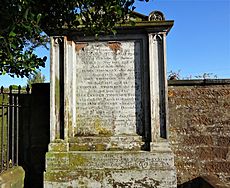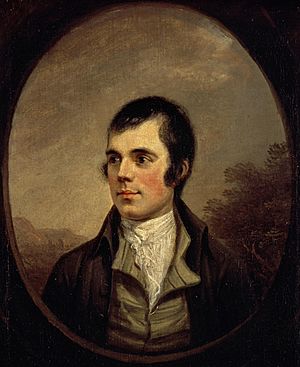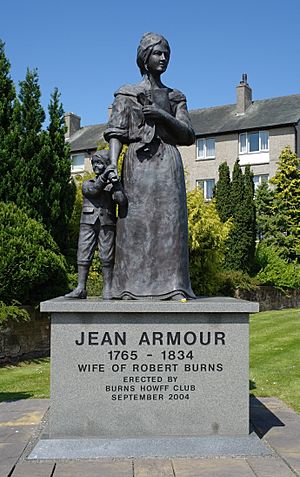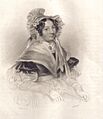Jessie Lewars facts for kids
Quick facts for kids
Jessie Lewars
|
|
|---|---|
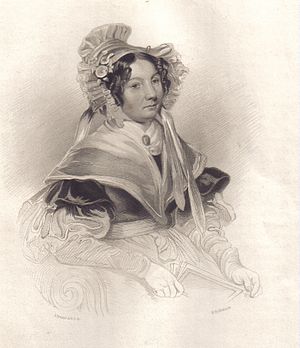
Jessie Lewars
|
|
| Born | 1778 Dumfries, Scotland
|
| Died | 26 May 1855 Maxwelltown, Scotland
|
| Occupation | Housewife |
Jessie Lewars, also called Mrs. James Thomson, was the youngest daughter of John Lewars. Her father worked as a supervisor for the government. When Jessie was 11, her father died. She and her brother John moved to a house in Dumfries. It was right across from the home of the famous poet, Robert Burns. Jessie became a close friend of the Burns family. When she was almost 18, she helped them a lot. She nursed Robert Burns when he was very sick. She also helped with chores around their home.
Jessie's Life and Family
Jessie had a brother named John and an older sister, Mary. Mary married William Hyslop, a builder in Dumfries.
Robert Burns once joked that Jessie would marry a lawyer. On June 3, 1799, Jessie married James Thomson, who was a lawyer in Dumfries.
Jessie and James had five sons and two daughters. Their children were James (born 1800), John (born 1802), William (born 1805), Thomas (born 1810), and Alexander (born 1814). Their daughters were Mary (born 1807) and Jessie (born 1816).
Mary married George Montgomery, a merchant from Dumfries, in 1840. They had a son named George and a daughter named Jessie Lewars Montgomery. Jessie, the younger daughter, never married.
Jessie Lewars lived in Dumfries for the rest of her life. She passed away on May 26, 1855, at age 77. Her husband, James Thomson, had died a few years earlier in 1849. Jessie and her husband were buried in Saint Michael's churchyard in Dumfries. Their grave is across from Robert Burns's mausoleum.
Jessie's Friendship with Robert Burns
Jessie's brother, John Lewars, worked with Robert Burns. He even taught Burns about his job when Burns joined the service.
Jessie did more than just nurse Robert Burns during his last illness. She also cared for his four young sons. This was while his wife, Jean, was recovering from giving birth to their youngest child, Maxwell Burns. Young Robert, one of their sons, even stayed with Jessie for almost a year.
From April 1796 until his death in July, Robert Burns was often too sick to leave his room. During this time, Jessie would play music and sing for him. Burns thought she had a beautiful singing voice, like a Linnet bird.
He grew very fond of Jessie. He even wrote his very last song, "O wert thou in the cauld blast," for her. He wrote it after hearing Jessie sing a popular song called "The Robin cam' to the Wren's Nest." The composer Felix Mendelssohn later set this song to his own music. Burns also wrote another song for her, "Altho' thou maun never be mine."
One time, when Jessie was briefly ill, Robert offered to write an epitaph for her. He joked, "In case of the worst, Jessy, let me provide you with an epithaph":
Jessie's Illness
Say, sages, what's the charm on earth
Can turn Death's dart aside?
It is not purity and worth,
Else Jessie had not died!
Her Recovery
But rarely seen since Nature's birth
The natives of the sky!
Yet still one seraph's left on earth,
For Jessie did not die.
He also wrote a rhymed toast to her on a crystal goblet. He used a diamond pen and asked her to keep it forever:
The Toast
Fill me with the rosy wine;
Call a toast, a toast divine;
Give the Poet's darling flame;
Lovely Jessie be her name:
Then thou mayest freely boast
Thou hast given a peerless toast.
Burns also wrote a special tribute to Jessie on the back of a handbill from a menagerie (a collection of wild animals). Jessie kept this handbill for the rest of her life:
Talk not to me of savages
From Afric's burning sun:
No savage e'er can rend my heart,
As Jessie thou hast done.
But Jessie's lovely hand in mine,
A mutual faith to plight,
Not even to view the Heavenly choir
Would be so blest a sight.
Jessie Lewars's great-granddaughter, Jessie Lewars Dove, later inherited this handbill. It was shown to the public again around 1940.
Burns also asked James Johnson in Edinburgh to send a copy of The Scots Musical Museum to Jessie. He wrote, "My wife has a very particular friend, a young lady who sings well, to whom she wishes to present the Scots Musical Museum." Johnson sent three copies. Burns wrote a heartfelt message in Jessie's copy, thanking her for her kindness:
Thine be the volumes, Jessie fair,
And with them take the Poet's prayer:
That Fate may in her fairest page.
With ev'ry kindliest, best presage
Of future bliss, enrol thy name:
With native worth and spotless fame.
And wakeful caution, still aware
Of ill – but chief man's felon snare;
All blameless joys on earth we find,
And all the treasures of the mind —
These be thy guardian and reward;
So prays thy faithful friend, the Bard.
Burns dedicated the song "O, Wert Thou in the Cauld Blast" to Jessie Lewars. It was set to the tune "Lennox Love to Blantyre." This song was first printed in 1800, but Burns wrote it around 1795.
O wert thou in the cauld blast,
On yonder lea, on yonder lea,
My plaidie to the angry airt,
I'd shelter thee, I'd shelter thee;
Or did Misfortune's bitter storms
Around thee blaw, around thee blaw,
Thy bield should be my bosom,
To share it a', to share it a'.
Burns also gave Jessie a thin book called Pindarinia by Peter Pindar, from 1794. He wrote inside it, "Un petit gage de Vamitie. R. Burns." This means "a small token from a friend."
After Robert Burns died, Jessie's brother John wrote letters on behalf of Jean Armour Burns. He wrote to many of Robert's close friends. Jessie remained a good friend to Jean Armour Burns and continued to support the family. She helped care for the four young Burns brothers.
Years later, Jessie shared a memory about Burns with Robert Chambers. She said that if Burns came home and dinner wasn't ready, he was never upset. He would happily eat whatever was available, even just bread and cheese. He would sit with his book and seem very happy.
Images for kids


